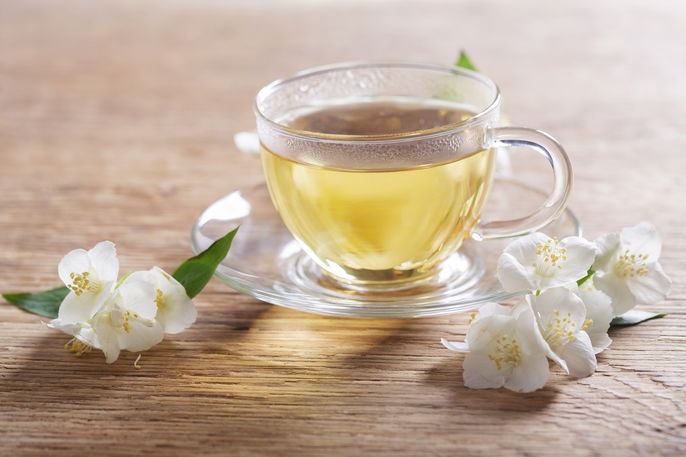Jasmine tea (made with Jasminum officinalis) is a warm drink that can be prepared to help combat insomnia, relieve pain, reduce stress and reduce PMS symptoms.
Jasmine tea contains several health benefits due to the flavonoids and polyphenols that are found in its composition. These provide it with naturally antioxidant, analgesic and soothing properties.
Jasmine tea can be found in pharmacies or health food stores, and should be used with the guidance of a doctor or other healthcare professional with experience using medicinal plants.

Health benefits
Jasmine tea can provide many health benefits like:
1. Fighting insomnia
Jasmine tea can promote relaxation of the nervous system, making it a great option for naturally combating insomnia and improving sleep quality.
However, more scientific studies on humans are still needed to support the benefits of jasmine tea for insomnia.
Also recommended: 10 Top Teas for Sleep: Chamomile, Valerian & More tuasaude.com/en/tea-for-sleep2. Relieving pain
Jasmine tea can help to relieve headaches, migraines, muscle pain, stomach pain and toothaches, as it contains naturally analgesic and anti-inflammatory properties.
3. Treating stress and anxiety
Jasmine tea has a sweet and floral fragrance, with a calming and sedative effect. It can be used to complement the medical treatment of depression or anxiety. Learn more about other herbs for anxiety and stress that you can use to make tea.
4. Reducing PMS symptoms
Jasmine tea can help to reduce PMS symptoms, such as irritability and cramps due to its calming, relaxing and analgesic action.
5. Providing antimicrobial action
Jasmine tea has an antimicrobial effect that can be beneficial in getting rid of bacteria like Escherichia coli, Staphylococcus aureus and Bacillus cereus. These are bacteria that are associated with urinary and intestinal infections.
6. Preventing premature aging
Because it contains polyphenols and flavonoids with antioxidant properties, jasmine tea can help to slow down premature aging and prevent damage to the skin caused by free radicals.
How to make jasmine tea
The parts of jasmine plants that are used to prepare tea are its flowers, which can be used in their fresh or dried forms.
Ingredients:
- 1 teaspoon of dried jasmine flowers
- 1 cup (tea) of water
Directions
Boil the water in a pot, then remove from heat and add the jasmine flowers. Cover and soak for 2 to 3 minutes. Then strain and drink a maximum of 3 cups per day.
This tea can also be prepared with one jasmine tea bag in a cup of boiling water. Let the teabag steep for 2 to 3 minutes and then drink while still warm.
Possible side effects
The side effects of jasmine tea are not yet fully known. Therefore, its use for medicinal purposes should only be monitored by a doctor or medicinal plant specialist.
Contraindications for use
Jasmine tea should not be used during pregnancy or when breastfeeding, nor should it be consumed by children, as there are not enough studies available to support the safety of this drink in these populations.
Furthermore, jasmine tea should also not be used by people who are allergic to this plant.
People who use medications regularly should always consult their doctor before consuming jasmine tea, as this medicinal plant can alter the effects of some medications.






























